| Irenium | |
|---|---|
| Scientific classification | |
| Domain: | Eukaryota |
| Kingdom: | Animalia |
| Phylum: | Cnidaria |
| Class: | Hydrozoa |
| Order: | Leptothecata |
| Family: | Eirenidae |
| Genus: | Irenium Haeckel, 1879 |
Irenium is a genus of hydrozoans in the family Eirenidae.
| Irenium | |
|---|---|
| Scientific classification | |
| Domain: | Eukaryota |
| Kingdom: | Animalia |
| Phylum: | Cnidaria |
| Class: | Hydrozoa |
| Order: | Leptothecata |
| Family: | Eirenidae |
| Genus: | Irenium Haeckel, 1879 |
Irenium is a genus of hydrozoans in the family Eirenidae.
The genus contains the following species: [1]
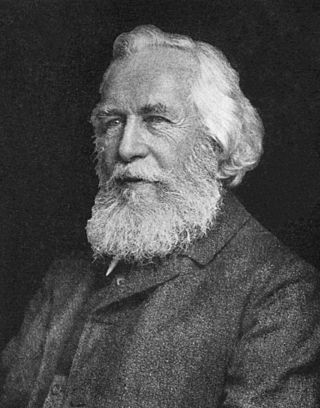
Ernst Heinrich Philipp August Haeckel was a German zoologist, naturalist, eugenicist, philosopher, physician, professor, marine biologist and artist. He discovered, described and named thousands of new species, mapped a genealogical tree relating all life forms and coined many terms in biology, including ecology, phylum, phylogeny, and Protista. Haeckel promoted and popularised Charles Darwin's work in Germany and developed the influential but no longer widely held recapitulation theory claiming that an individual organism's biological development, or ontogeny, parallels and summarises its species' evolutionary development, or phylogeny.

The Noctilucales are an order of marine dinoflagellates. They differ from most others in that the mature cell is diploid and its nucleus does not show a dinokaryotic organization. They show gametic meiosis.
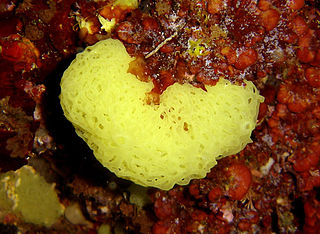
Clathrina is a genus of calcareous sponge in the family Clathrinidae. Several species formerly in Clathrina were transferred to the newly erected genera Arturia, Ernstia, Borojevia, and Brattegardia in 2013. The name is derived from the Latin word "clathratus" meaning "latticed".
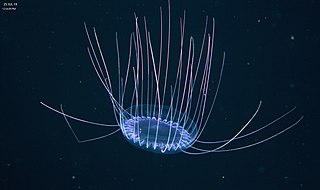
Solmissus, or dinner plate jellyfish, is a genus of hydrozoans. Its species are unique among cnidarians in that they actively hunt for prey as opposed to passively waiting for plankton to pass by. They are found in the deep waters of Monterey Bay, California. They are most likely to be found in the deep sea, mid water. They grow to be 20 cm (7.9 in) in diameter. These hydrozoans feed on gelatinous zooplankton, including salps and doliolids, ctenophores, jellyfish, and copepods. However, Solmissus may be limited to feeding on soft-bodied prey by the type of nematocysts on their tentacles (Mills).

Monera is historically a biological kingdom that is made up of prokaryotes. As such, it is composed of single-celled organisms that lack a nucleus.
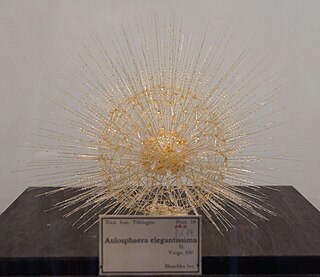
Aulosphaera is a genus of Cercozoa. The genus contains bioluminescent species. It one of two known bioluminescent phaeodarean genera, the other being Tuscaridium. The described bioluminescent species is Aulosphaera triodon Haeckel, 1887.
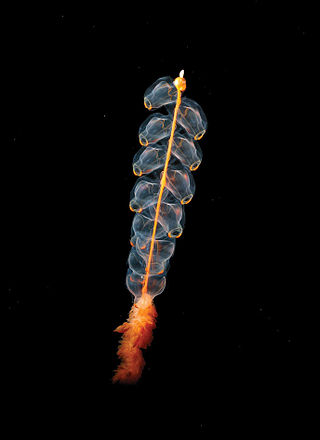
Agalmatidae, or Agalmidae, is a family of siphonophores.
Solmarisidae is a family of hydrozoans in the order Narcomedusae. The name is sometimes spelled "Solmaridae".

Bougainvillia is a genus of hydroids in the family Bougainvilliidae in the class Hydrazoa. Members of the genus are characterised by having the marginal tentacles of their medusae arranged in four bundles. Some species are solitary and others are colonial but all are filter feeders. They are found in the Southern Ocean, having a circumpolar distribution, but some species also occur in the Northern Hemisphere, possibly travelling there as polyps on the hulls of ships.

Aeginura is a genus of hydrozoans in the family Aeginidae.

Aglantha is a genus of deep-sea hydrozoans of the family Rhopalonematidae.

Eirenidae is a family of hydrozoans.

Catablema is a genus of cnidarians belonging to the family Pandeidae.
Mitrocomium is a genus of cnidarians belonging to the family Lovenellidae.
Pteronema is a genus of hydrozoans belonging to the monotypic family Pteronemidae.
Codonium is a genus of hydrozoans belonging to the family Corynidae.
Staurodiscus is a genus of hydrozoans belonging to the family Hebellidae.

Staurostoma is a genus of cnidarians of the family Laodiceidae. The genus contains two described species.

Eutima is a genus of hydrozoans in the family Eirenidae.
Eutimalphes is a genus of hydrozoans in the family Eirenidae.